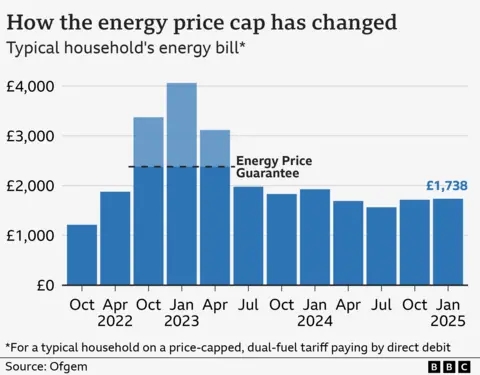Energy Bills Rise 6.4% in April: Key Insights for Households
UK energy bills are set to rise by 6.4%—explore the reasons behind this increase and tips for managing rising household costs.

Key Points
- The energy price cap will rise by 6.4% in April, increasing average household bills to £1,849 per year.
- In addition to energy costs, households will face rising expenses in water bills, council tax, and broadband services.
- Investing in renewable energy solutions is essential for long-term savings and reducing reliance on volatile global gas markets.
The energy landscape in the UK is undergoing significant changes, with households facing a 6.4% increase in energy bills starting April 1. As the energy price cap reaches a new benchmark, many are left wondering how this impacts their daily budgets. In this blog post, we will break down the essential details regarding these changes, offer insights into the reasons behind rising costs, and discuss potential paths forward for consumers feeling the pinch.
The Energy Price Cap Adjustment
Ofgem, the energy regulator, has recently announced that the price cap will rise from £1,738 to £1,849 per year for the average household on a standard variable tariff. This increase translates to approximately £9.25 more per month. This situation is challenging, especially given that prices are still 22% lower than the peak experienced during the crisis in early 2023.

The rise is attributed to a recent surge in wholesale energy prices, which have become increasingly volatile, reflecting greater dependency on international gas markets. Ofgem's CEO, Jonathan Brearley, has emphasized the importance of investing in a more sustainable, homegrown energy system to mitigate future costs.
The Ripple Effects on Household Budgets
Beyond energy costs, households will also experience various increases in other necessary expenses. Water bills in England and Wales are projected to rise by an average of 20% this upcoming year, amounting to £86, due to extensive underinvestment in infrastructure. Other areas affected include council tax and broadband services, further stretching household budgets.

With these mounting costs, families may feel overwhelmed by the cumulative effect of these bills and seek ways to optimize their energy utilization. For instance, consumers can shift their energy usage to off-peak hours to decrease costs or consider alternatives like renewable energy sources, which may offer long-term savings.
A Call for Action: Embracing Renewable Energy
While the rise in bills is undeniably troubling, it also provides a re-emphasized need to accelerate the transition towards renewable energy solutions. Experts warn against the notion that increasing costs indicate that the shift to renewables is failing. In fact, the opposite may be true. Investing in clean energy systems will not only create a more stable market in the long run but also ensure that the UK is less reliant on fluctuating global gas prices.
Dr. Craig Lowrey of
stresses, “The need for renewable investments is more critical than ever. Short-term measures, including social tariffs and one-off payments, should be prioritized to protect vulnerable households during this transition”.

Looking Ahead: Preparing for Future Costs
As the energy cost landscape evolves, households must prepare for future challenges. With bills expected to rise further later in the year, it is essential for consumers to reassess their energy consumption habits and explore potential cost-saving measures. Engaging with community energy-saving initiatives or considering energy-efficient appliances could also yield significant savings over time.
This new pricing structure is an important moment for reflection. While the immediate implications of rising energy costs are daunting, they also pave the way for essential investments in the energy transition, contributing to a greener future and greater energy security.
Ultimately, remaining informed and proactive is crucial as we navigate this period of adjustment. By understanding the reasons behind these price changes and exploring innovative solutions, households can better manage their budgets and contribute to a sustainable energy future.


